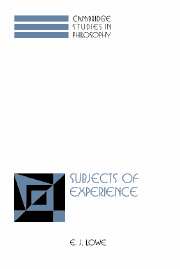1 - Introduction
Published online by Cambridge University Press: 22 October 2009
Summary
The central topic of this book is what would traditionally be called the ‘mind-body problem’. In my view, however, part of what has historically generated a problem of this name is the very choice of these terms, ‘mind’ and ‘body’, to denote entities whose relationship to one another supposedly calls for explanation. I would prefer to speak of the self-body problem, for I do not wish to reify the ‘mind’ as an entity on a par with the body. Selves or persons ‘have’ both minds and bodies – but ‘having’ is not to be understood univocally for both cases. Selves ‘have’ minds inasmuch as they are essentially subjects of mental states – of thoughts, experiences, intentions and the like. But they ‘have’ bodies in a quite different and genuinely relational sense: for persons and their bodies are each distinct kinds of entity in their own right. Bodies (in the sense of the term now relevant) are organized material objects, capable of undergoing growth and change in their material parts, subject to the retention of certain basic characteristics of form and function. However, neither they nor their parts are genuine subjects of mental states: it is persons or selves who think, feel and act intentionally, not their bodies or their brains. This, if true, is enough to establish the non-identity of selves with their bodies, though by no means implies that selves are wholly immaterial and separable from their bodies.
- Type
- Chapter
- Information
- Subjects of Experience , pp. 1 - 13Publisher: Cambridge University PressPrint publication year: 1996



